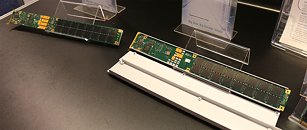- Joined
- Oct 9, 2007
- Messages
- 47,297 (7.53/day)
- Location
- Hyderabad, India
| System Name | RBMK-1000 |
|---|---|
| Processor | AMD Ryzen 7 5700G |
| Motherboard | ASUS ROG Strix B450-E Gaming |
| Cooling | DeepCool Gammax L240 V2 |
| Memory | 2x 8GB G.Skill Sniper X |
| Video Card(s) | Palit GeForce RTX 2080 SUPER GameRock |
| Storage | Western Digital Black NVMe 512GB |
| Display(s) | BenQ 1440p 60 Hz 27-inch |
| Case | Corsair Carbide 100R |
| Audio Device(s) | ASUS SupremeFX S1220A |
| Power Supply | Cooler Master MWE Gold 650W |
| Mouse | ASUS ROG Strix Impact |
| Keyboard | Gamdias Hermes E2 |
| Software | Windows 11 Pro |
At the Flash Memory Summit (FMS) 2018, LITE-ON Storage previewed the first EDSFF 1U solid-state drive (SSD) to emerge from its work with CNEX Labs. The revolutionary drive gained great interest among storage advocates.
In collaboration with such partners, LITE-ON delivers an innovative and highly efficient storage solution for scalable computing that aligns to Open Compute Project (OCP) specifications. The resulting EDSFF (Enterprise and Datacenter SSD Form Factor) SSD will provide a more cost-effective solution for enterprise and hyperscale cloud environments.
"Standard SSD solutions are great at handling many typical business workloads, but the complexity of storing information in both cloud and data center infrastructure requires SSD firmware to be flexible and adaptable," said Charlie Tseng, CEO of LITE-ON Storage. "LITE-ON's expertise in SSD firmware is perfect for the varying needs of customers."

The new LITE-ON SSD EDSFF solution delivers storage density, system design flexibility, thermal efficiency, scalable performance and easy maintenance with front-load hot swap capabilities. The hardware design also supports low-latency, 3D TLC and low-cost QLC NAND flash based depending on end-users' specific cloud applications.
Leveraging the CNEX controller's flexible dual-mode interface support, the LITE-ON SSD EDSFF protocol is configurable between traditional NVMe logical block addressing and the upcoming Denali software-defined interface (formerly Open-Channel SSD).
"CNEX is thrilled to be working with LITE-ON on next-generation SSDs for cloud infrastructure," said Dr. Alan Armstrong, CEO and Co-Founder of CNEX Labs. "SSDs are experiencing explosive growth due to their inherent performance advantages, but the industry must move beyond legacy designs to provide more advanced, flexible, cost-effective solutions for non-heterogenous environments. In concert with LITE-ON, we bring this to reality through CNEX's hardware design expertise and proprietary low-latency SSD controllers, which feature best-in-class performance, QoS, low power consumption, and flexible support for media technologies and vendors."
The LITE-ON SSD EDSSF is designed for ultimate flexibility for non-heterogenous and rapidly evolving cloud workloads - from high IOPS density artificial intelligence (AI) and compute-intensive applications to high capacity density near-line storage use cases. The initial design supports the EDSFF 1U Long form factor and 16TB of Toshiba Memory Corporation BiCS3 3D TLC NAND. However, capacity can go up to as high as 80TB with QLC technology.
No timetable for the new SSD's release was announced.
View at TechPowerUp Main Site
In collaboration with such partners, LITE-ON delivers an innovative and highly efficient storage solution for scalable computing that aligns to Open Compute Project (OCP) specifications. The resulting EDSFF (Enterprise and Datacenter SSD Form Factor) SSD will provide a more cost-effective solution for enterprise and hyperscale cloud environments.
"Standard SSD solutions are great at handling many typical business workloads, but the complexity of storing information in both cloud and data center infrastructure requires SSD firmware to be flexible and adaptable," said Charlie Tseng, CEO of LITE-ON Storage. "LITE-ON's expertise in SSD firmware is perfect for the varying needs of customers."

The new LITE-ON SSD EDSFF solution delivers storage density, system design flexibility, thermal efficiency, scalable performance and easy maintenance with front-load hot swap capabilities. The hardware design also supports low-latency, 3D TLC and low-cost QLC NAND flash based depending on end-users' specific cloud applications.
Leveraging the CNEX controller's flexible dual-mode interface support, the LITE-ON SSD EDSFF protocol is configurable between traditional NVMe logical block addressing and the upcoming Denali software-defined interface (formerly Open-Channel SSD).
"CNEX is thrilled to be working with LITE-ON on next-generation SSDs for cloud infrastructure," said Dr. Alan Armstrong, CEO and Co-Founder of CNEX Labs. "SSDs are experiencing explosive growth due to their inherent performance advantages, but the industry must move beyond legacy designs to provide more advanced, flexible, cost-effective solutions for non-heterogenous environments. In concert with LITE-ON, we bring this to reality through CNEX's hardware design expertise and proprietary low-latency SSD controllers, which feature best-in-class performance, QoS, low power consumption, and flexible support for media technologies and vendors."
The LITE-ON SSD EDSSF is designed for ultimate flexibility for non-heterogenous and rapidly evolving cloud workloads - from high IOPS density artificial intelligence (AI) and compute-intensive applications to high capacity density near-line storage use cases. The initial design supports the EDSFF 1U Long form factor and 16TB of Toshiba Memory Corporation BiCS3 3D TLC NAND. However, capacity can go up to as high as 80TB with QLC technology.
No timetable for the new SSD's release was announced.
View at TechPowerUp Main Site








